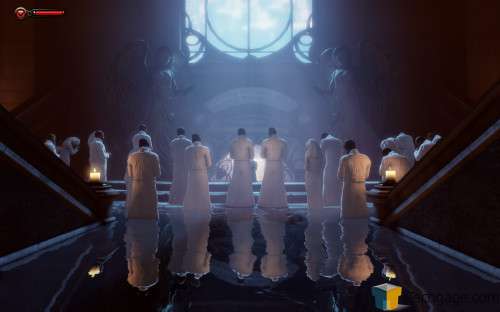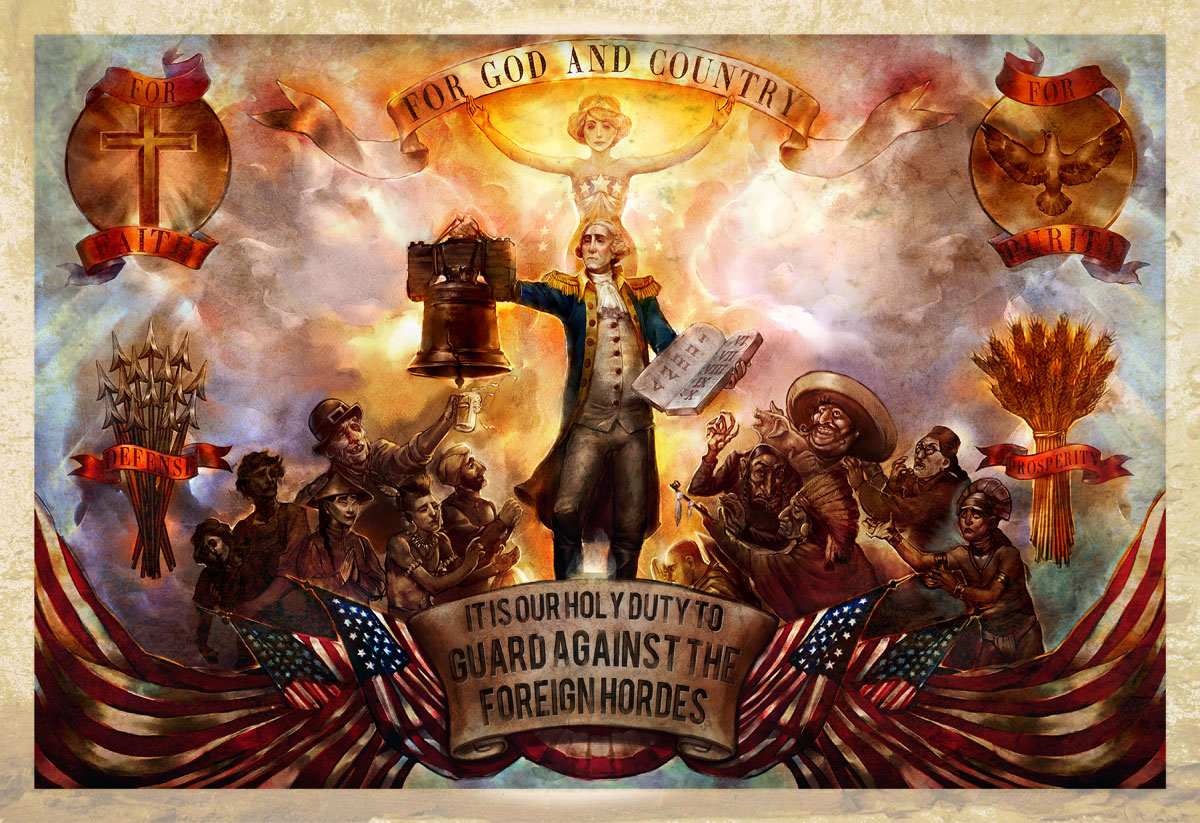Sesana
and Carol were both tempted into playing BioShock: Infinite, the latest in the
BioShock game series developed by Irrational Games and published by 2K Games,
released in 2013. Formatted for PC, Playstation and Xbox 360. Infinite is set
in 1912, in the flying city of Columbia. Players take the role of Booker
DeWitt, a former Pinkerton Agent. Booker is on a mission to “save the girl,” a
young woman named Elizabeth. In the process, they discover a great deal about
Columbia and each other.
Warning: extensive spoilers follow after the jump.
Carol:
I'm not a FPS (first person shooter)
gamer, but have extensively played a couple of massive-multi-player and
single-person role playing games. One of the aspects I love in BioShock is how
accessible it is to people who may not be familiar with shooters. There are
lots of cues how to get to the next goal, whether it is signs, vocal musings
from Dewitt or suggestions from Elizabeth. If the player wants, they can even
press a key and a directional arrow will appear. As a newbie, I appreciated
having three difficulty levels--when I first played through, I went with
'easy,' which shows you just how bad I am. Playing through on 'normal' means I
have to be more strategic so I don't die every fight. Which reminds me--I like
the easy 'rebirth' that basically loses a little health and money--it
encouraged me to experiment a little more and not worry about dying.
Sesana:
 I actually don't play that many
shooters, either, though I've been doing more lately. I'm honestly not very
good at them, either. The attention to detail was really impressive here. The
visual style is very consistent, so there's a real sense of a specific time.
The print ads scattered around Columbia, for example. They look exactly like early 20th century ads. Of course, they're beautiful to look at, but they also add to the feeling that this is 1912. There are hundreds of tiny details that add to the atmosphere. I have a feeling I'll still be discovering new things in the setting even after having played the game half a dozen times.
I actually don't play that many
shooters, either, though I've been doing more lately. I'm honestly not very
good at them, either. The attention to detail was really impressive here. The
visual style is very consistent, so there's a real sense of a specific time.
The print ads scattered around Columbia, for example. They look exactly like early 20th century ads. Of course, they're beautiful to look at, but they also add to the feeling that this is 1912. There are hundreds of tiny details that add to the atmosphere. I have a feeling I'll still be discovering new things in the setting even after having played the game half a dozen times.
Carol:
I love the setting visuals. BioShock
2 was known for amazingly realistic water reflections and movement and I can
see where some of that experience translated over in awesome water, oil, and
cloud graphics. I loved the outdoor fair setting, but also enjoyed the variety
of settings, indoors and out.
I was also really impressed with the sound , especially the old-timey phonographs and movie reels, a device that carried over from Bio2. The music was perfectly coordinated--it matched the setting and action so well. The second time through I found a bonus where Elizabeth sings--I think it was Amazing Grace--when Booker picks up a guitar. It was beautiful. What were your thoughts on the sound?
Sesana:
How could I miss it? I loved the way
they used anachronistic songs to add to the sense of unease. There's obviously
something "off" here, and hearing a phonograph in 1912 play a version
of "Tainted Love" really drives that home. Sure, it does get
explained eventually, but the first time you realize that you're hearing an
impossible song is quite a jolt.
How about gameplay? I thought the
sky-lines that were roller-coaster-like were pretty innovative and cool. I've
never played a game that incorporated a similar movement strategy. I did find
that the movement graphics are a little puppet-like with Elizabeth--sometimes
I'd see her gliding around but making little click-click boot-heel noises.
Sesana:
I loved riding the sky-lines. Such a
cool-looking mechanic. And some of the powers are just amazingly fun. My first
playthrough, I used Murder of Crows almost exclusively, because it was just so
damn fun. I did notice some weird graphical things going on with Elizabeth. The
first time she suddenly materialized half a room away from where I'd last seen
her startled me a bit, though I get where that would be useful from a technical
standpoint. But it didn't happen often enough that I couldn't just overlook it,
in the face of all that was beautiful and, well, right about Columbia.
Carol:
I love the powers. I think that is
also what makes Bio different from other shoooters for me. Along the way in the
story, the player can pick up 'powers,' previously explained as genetic changes
in Bio2. These are a lot of fun--the crows, electroshock, telekinesis,
possession and more. I like that the game allows the player to customize or
advance certain powers over other through purchasing upgrades with found money.
I think that is so clever and allows for different play styles.
The Wiki site mentions controversy
surrounding the three themes of "racism, extreme religion and an ideological society " What did you think?
Sesana:
I felt like the racism was necessary
for the message Irrational was going for with Infinite. Like the original
BioShock targeted objectivism, and Bioshock 2 targeted collectivism, Infinite was going after American exceptionalism, the idea that America and Americans are unique in the world, inherently special. And racism was part and parcel of that set of ideas, at least at the time. But it was
very disturbing, so much so that I had to pause the game and collect myself at
the raffle. I'm not used to seeing a video game confront real world racism so
unflinchingly.
Carol:
The portrayal of blatant racism was
surprising. After finishing, I thought how odd that part was--it didn't seem to
connect with Booker and Elizabeth. I admired its inclusion at the time, because
I thought it was innovative of a game to acknowledge history that is generally
attempted to be white-washed or forgotten. The second time through, I started
to wonder if it was included to be subversive and provide validation for that
point of view. It's odd. The raffle scene shocked me too--it was so reminiscent
of a stoning. I'm playing through now and both times elected to throw the ball
at the announcer. Have you chosen the other way? Apparently it goes to the
exact same sequence where they stop you and look at the brand on your hand.
Sesana:
It's the carnival atmosphere of the
raffle, something that you read about sometimes in real life accounts of
lynchings, that makes it so disturbing. And yet, that's not unrealistic for the
time. Reading about what happened to Ell Persons, for example, tells me that
the developers both did their homework and spared us the most disturbing
details.
Carol:
That makes sense, that racism was
part of the American exceptionalism. I found it interesting when they included
'Irish' in their racism (I think it was excluding them from public restrooms).
It also hit home for me when Dewitt said "or I'd be scotched." I
never thought about that term as racially derived, but of course it must have
been.
Sesana:
I really liked the time
travel/alternate reality hopping aspect, once it showed up. It's very different
from the previous BioShock games. Sure, they were out there, but nothing quite
this convoluted. I love science fiction (big Doctor Who fan here) so I was
happy to see it. It's very hard to do this sort of thing right, and I think
they mostly got it. Once I could understand what was going on, of course.
Carol:
I'm confused about some of the time
traveling, so I'm hoping another play through makes it clear. My interpretation
is that Elizabeth is his daughter from Anna--did I get that wrong? It was the
scene near the end in which Comstock pulls her through the rift and her pinky
gets left behind.
Sesana:
Yes, Elizabeth is Booker's daughter.
Her name was originally Anna. Booker's wife was never named, but I wouldn't be
surprised if she were Anna, too, and Booker had named his daughter after her
dead mother.
Carol:
Hmm, I had assumed 'Anna' was his
wife. Interesting. I guess I didn't listen well enough. The story is complex
enough that playing it again is worthwhile. But time travel always gets me. If
Comstock is killed in all the worlds, wouldn't Elizabeth also disappear?
I've put a lot of thought into deciphering this, because they do leave much unsaid. The important thing, of course, is the baptism, that exact baptism at that exact moment in Booker/Comstock's history. So the Elizabeths drowning Booker eliminated every version of Booker that sought that baptism from that preacher at that time, both the ones that went through with it and the ones who didn't. But it left intact every other version of Booker: the ones that never considered a religious conversion, the ones who found it later or earlier in life, and the ones who sought out a less extreme form of religion. (The preacher who baptized Comstock is the one who nearly drowned Booker at the start of the game, so he was probably an extremist then, too.) Some of these other Bookers could have gone on to have Anna/Elizabeth, or other children.
Obviously, we both loved this game. Bioshock: Infinite was, for me, one of those very rare games that I play twice in a row immediately. The other games in that elite category? The first two Bioshock games and the Portal games. As far as I'm concerned, Infinite nailed it in just about every category: visuals, gameplay, characters, story, voice acting.
Carol:
I completely agree with you. Even if you rarely play video games, I'd add this to the top of the "must try" list.
For more information about Bioshock: Infinite, check out the official website here.








Awesome job ladies!!! Now I really want to give this a go!
ReplyDelete